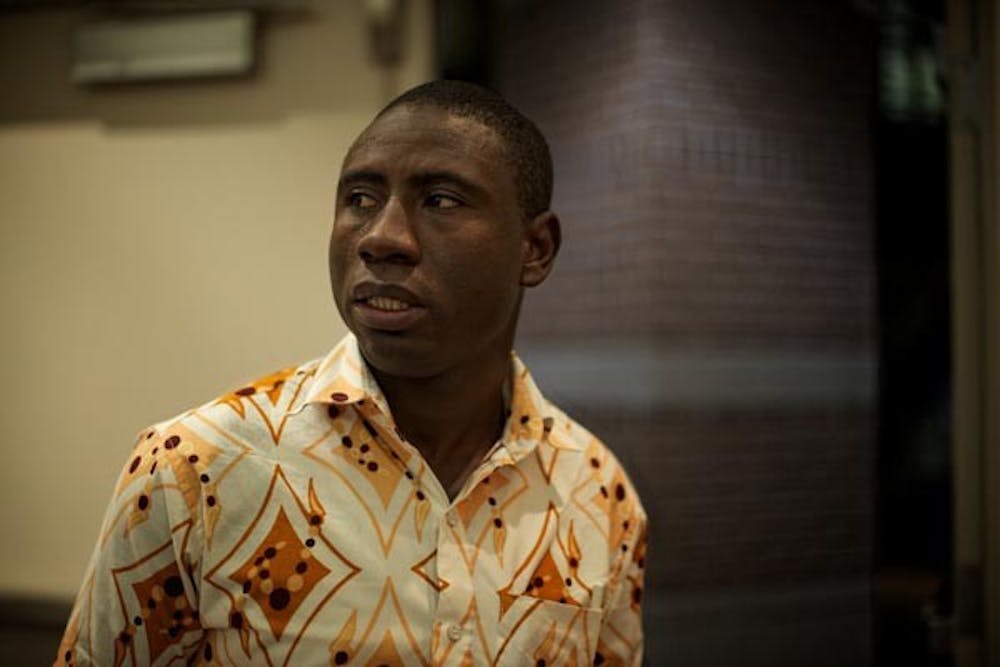Despite various laws around the world outlawing slavery and human trafficking, they are still prevalent in the world.
James Kofi Annan, a former child slave from Ghana, spoke at the West campus Wednesday night about his experiences as a slave and how he is now helping solve the problem.
During the presentation, Annan recounted stories about how child slaves were brutally treated and what being a slave was like.
He was sold into slavery and trafficked to Lake Volta in southeastern Ghana — where many child slaves are taken — to work for a fisherman when he was 6 years old. During his captivity, he was often beaten by his master and forced to do life-threatening tasks every day.
For example, every time the fishing net got caught on debris underwater, he would have to swim down and unhook it. More than once, Annan nearly drowned.
Regularly, the child slaves would wake up at 3 a.m. and work until 8 p.m. eating only once each day.
After seven years of working, Annan escaped at age 13 and promptly put himself through school with no help from his parents. His father was disappointed that he ran away, and while his mother wanted to help him, women have no voice in the society.
He now has a master’s degree in communication, set up an organization in 2003 called Challenging Heights that works to free child slaves, and has won four international awards for his work, including the 2008 Frederick Douglass Award. This award is given to an individual who has survived a form of slavery and is now using his or her life and freedom to help others.
“[This is] a freedom I really cherish, because at least I’m free from torture and abuse,” Annan said.
The journey to bring Annan to ASU started this summer when 13 graduate students, faculty and community members went to Ghana. During their trip, they immersed themselves in the culture and interviewed the leaders of various organizations to see if they could speak at ASU.
“We chose people who we thought could carry out the purpose of the grant and change lives,” said Charles St. Clair, who teaches acting, filmmaking and directing at West campus in the College of Interdisciplinary Arts and Sciences and set up the trip to Ghana.
He also shot a documentary titled “Stories from the Other Side,” chronicling their trip, which will be released in February, St. Clair said.
One of their last interviews was with Annan. He was already going to be in the United States in the fall, so the group asked him if he would be willing to stop at ASU as well.
One of the people who went on the trip was high school teacher Bettina Bennett. Bennett teaches journalism at Betty H. Fairfax High School in Phoenix.
“We saw hardworking people with an incredible sense of vitality that can make anything work,” Bennett said.
In 2005, Ghana passed a law outlawing human trafficking. However, only two people have been prosecuted in violation of this law to date, despite the rampant use of child slaves depicted by people like Annan.
Out of the approximately 6.3 million children in Ghana, 242,000 of them are either enslaved or being trafficked, Annan said.
About 100 people attended the presentation, including students from a cross-cultural writing class who were told to go to the presentation for class.
“We’re very insulated from these issues in the Valley … it’s really good to be exposed to the realities other people are facing,” said Paul St. John, an English senior and a member of the writing class.
Because of his work, Annan said he has received death threats, especially after a slave owner in the area was prosecuted for human trafficking. For the next two weeks after the ruling, he received 13 death threats a day.
Despite this, Annan remains firm in his fight against human trafficking and child slavery.
“I’m not afraid, no I am not afraid,” Annan said.
Reach the reporter at connor.radnovich@asu.edu
Want to get the latest ASU news in your inbox every day? Sign up for our new e-mail newsletter.





